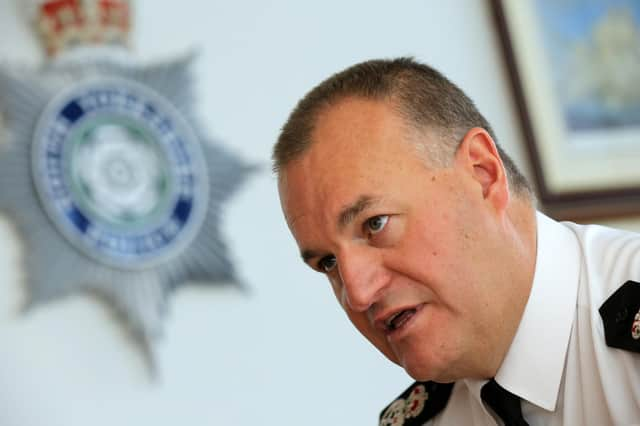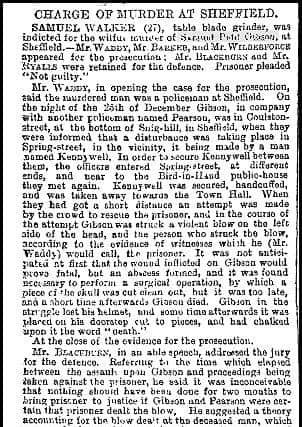Police mark anniversary of first Sheffield officer killed on duty


There had been 98 attacks on South Yorkshire police officers in the past seven weeks, compared to 71 in the same period last year.
Chief constable Stephen Watson called on people to show their support for officers who he described as deserving "the gratitude and respect that the vast majority of the public affords them".
Advertisement
Hide AdAdvertisement
Hide AdThe call comes exactly 165 years since William Beardshaw was fatally injured while on duty as a watchman for the first time, on July 22,1855.


The 26-year-old was hit on the head by a stone thrown by James Burke, aged 22, while he was arresting Cormack Dunlevy, 32.
A court in Sheffield heard that shop owner John Shannan had confronted and then apprehended robber Dunlevy, only for him to escape.
Shannan was quickly apprehended once again by the police, not far from the scene of the crime, and placed in leg irons and handcuffs.
Advertisement
Hide AdAdvertisement
Hide AdAt the same time approximately 1,000 men were protesting in the nearby West Bar Green and Paradise Square as part of what became known as the Irish Riots.
Dunlevy called to his fellow Irish compatraites for help.
He was heard to have shouted, 'will you see me taken?'. The mob responded to his pleas and started to attack the police with stones and 'brickbats'.
Dunlevy again escaped and later removed his leg irons and handcuffs.
In the melee which ensued William Beardshaw sustained injuries from thrown objects. Despite serious injury, he continued his shift - finishing at 6am on Sunday morning.
Advertisement
Hide AdAdvertisement
Hide AdThat night he reported for duty again even though he'd complained of being in pain that day.
Later on in his shift he went to father-in -laws as it was closer to his own home, and still felt unwell.
He passed away at 5am on Monday, July 23.
Witness Jane Jubb, said she saw Burke throw a stone which hit Beardshaw and heard a companion shout 'get out of the way you’ve hit a watchman'.
John Hill also witnessed Burke throw stones and heard him say 'he would kill the watchman'. Mr Hill helped carry another officer, named Dickenson, to the infirmary after he also received serious injuries from the mob.
Advertisement
Hide AdAdvertisement
Hide AdHe told the court that Burke hit him in the back with a stone placed in a sock and also stabbed Dickeson in the arm with a knife.
Another witness Thomas Chapsey also saw Burke kick the two policemen while they laid injured in the gutter.
Surgeon, Mr Wright, surgeon, proved that the officer's skull was fractured and the consequent extravasation of blood on the brain was the cause of death. The wound was such a one as was likely to have been produced by a stone.
Burke and Dunlevy were charged with a charge of wilful murder of a policemen. Both were sentenced to 15 years transportation to Australia and 12 months hard labour.
Advertisement
Hide AdAdvertisement
Hide AdWilliam Beardshaw is the earliest name listed on the Police Roll of Honour for Yorkshire.
Chief Constable of South Yorkshire Police Stephen Watson said: "The story of Watchman William Beardshaw, and how he came to be assaulted and killed on his first day in service is incredibly poignant.
"One can only imagine how shocking these events will have been for the community at that time and, of course, for his wider family in particular.
“The anniversary of his death, although many years ago, provides a wonderful opportunity to pay tribute to a public servant who succumbed to terrible injury in the execution of his duty.
Advertisement
Hide AdAdvertisement
Hide Ad“It is sadly the case that police officers continue to be regularly assaulted as they go about seeking to be a force for good. I have been particularly disturbed to note that over the past seven weeks alone, we have experienced a 38 per cent increase in the number of officers assaulted in South Yorkshire.
“This means that your police officers have had to go home with a variety of injuries including cuts, bruises, bite marks, fractures and many other manifestations of unlawful violence which has been inflicted upon them. Some of their injuries are hidden and the effects of which can last a lifetime.
“As chief constable, one of the greatest privileges in my role is to serve alongside thousands of men and women who do what most wouldn’t or couldn’t, as a matter of routine. It is this that makes our police officers such remarkable people. They really do deserve the gratitude and respect that the vast majority of the public affords them.
“And so as we pay tribute to the memory of poor William Beardshaw, I ask that you join me in sparing a thought for our officers of today. The police are certainly not perfect and should strive always to improve. But despite the often exaggerated and unevidenced commentary from some quarters as to the perceived failings of the police, they do remain amongst the very best of us and the fulfilment of their duty is essential to the wellbeing of us all.”